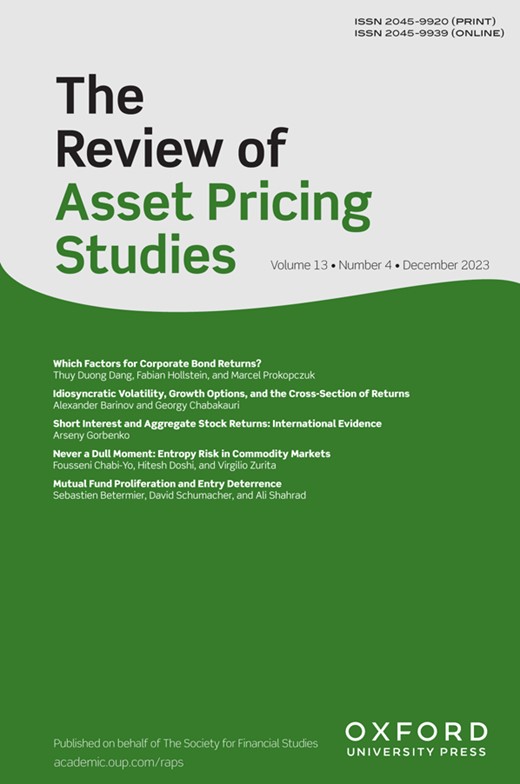Oil Price Exposure and the Cross-Section of Stock Returns
IF 2.2
Q2 BUSINESS, FINANCE
引用次数: 0
Abstract
We provide evidence that equity investors are slow to process information about how current oil price changes affect future earnings announcements. Stock prices respond to lagged quarterly oil price changes when firms start announcing earnings in the next quarter. A cross-sectional equity trading strategy that exploits this predictability yields an annualized Sharpe ratio of 0.50. Our oil-response forecast strategy earns especially high returns after large absolute oil price changes, in recessions or bear markets, and during peak earnings season. The predictability we document is consistent with limited attention, is not driven by risk factor exposure, and survives several robustness tests.石油价格风险与股票收益率横截面
我们提供的证据表明,股票投资者在处理有关当前油价变化如何影响未来盈利公告的信息方面进展缓慢。当公司在下一季度开始公布盈利时,股票价格会对滞后的季度油价变化做出反应。利用这种可预测性的横截面股票交易策略可获得 0.50 的年化夏普比率。我们的石油反应预测策略在绝对油价大幅变动后、经济衰退或熊市以及盈利旺季都能获得特别高的回报。我们所记录的可预测性与有限的注意力是一致的,不受风险因素影响,并通过了多项稳健性测试。
本文章由计算机程序翻译,如有差异,请以英文原文为准。
求助全文
约1分钟内获得全文
求助全文
来源期刊

Review of Asset Pricing Studies
BUSINESS, FINANCE-
CiteScore
19.80
自引率
0.80%
发文量
17
期刊介绍:
The Review of Asset Pricing Studies (RAPS) is a journal that aims to publish high-quality research in asset pricing. It evaluates papers based on their original contribution to the understanding of asset pricing. The topics covered in RAPS include theoretical and empirical models of asset prices and returns, empirical methodology, macro-finance, financial institutions and asset prices, information and liquidity in asset markets, behavioral investment studies, asset market structure and microstructure, risk analysis, hedge funds, mutual funds, alternative investments, and other related topics.
Manuscripts submitted to RAPS must be exclusive to the journal and should not have been previously published. Starting in 2020, RAPS will publish three issues per year, owing to an increasing number of high-quality submissions. The journal is indexed in EconLit, Emerging Sources Citation IndexTM, RePEc (Research Papers in Economics), and Scopus.
 求助内容:
求助内容: 应助结果提醒方式:
应助结果提醒方式:


